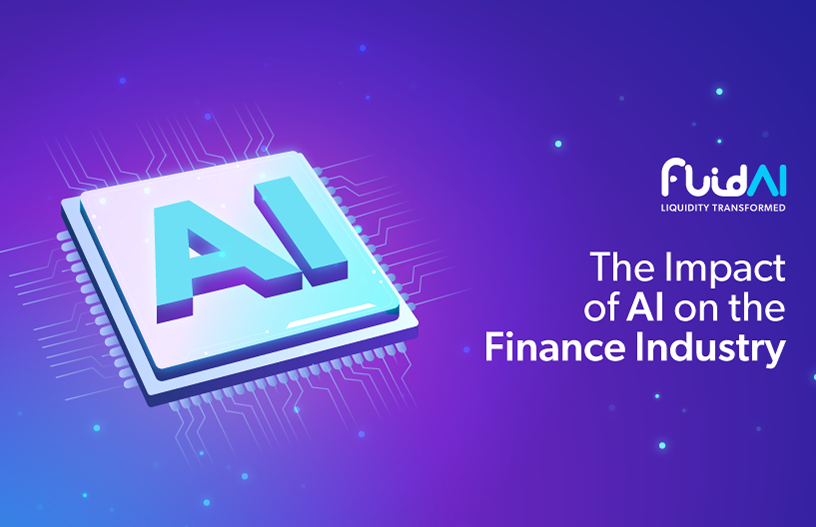Imperial College London and FluidAI Announce Groundbreaking AI Partnership! Read here 🤝

The Impact of AI on the Finance Industry
Over the last decade, artificial intelligence has snowballed, and no business or industry today is immune to its influence and pervasiveness. This is more evident in the financial services industry, which is constantly evolving and realizing that AI is a transformational technology.

The Impact of AI on the Finance Industry
Summary
- Artificial intelligence is changing how the TradFi industry functions and is opening the door to entirely new operating models
- Banks are exploring novel methods to incorporate AI into their services, with a potential cost saving estimated at $447 billion by 2023
- Tech-savvy customers are pushing financial institutions worldwide to apply AI algorithms with essential business benefits
Over the last decade, artificial intelligence has snowballed, and no business or industry today is immune to its influence and pervasiveness. This is more evident in the financial services industry, which is constantly evolving and realizing that AI is a transformational technology.
It doesn’t surprise that AI has helped organizations boost revenues by streamlining programs and procedures, automating repetitive jobs, and improving customer service. According to a Business Insider report, artificial intelligence technologies will likely save banks and financial organizations $447 billion by 2023. Additionally, around 80 percent of banks see AI’s potential benefits, and with the wider impact of COVID-19, which impacted the banking industry and drove more consumers to adopt the digital experience, it’s more vital than ever.
Benefits like technological advancements, improved consumer acceptability, and altered regulatory frameworks help financial institutions decide to employ AI. Financial institutions worldwide are applying AI algorithms with important business benefits and the emergence of tech-savvy customers.
Some of the most prevalent uses of AI in the finance sector are included below, along with how they continue to change the course and experience of financial services in terms of user experience.
1- Risk Management: It’s difficult to overestimate the impact of AI in financial services when it comes to risk management. An enormous processing power allows vast amounts of data to be handled quickly, and cognitive computing helps manage both structured and unstructured data, a task that would take far too much time for a human to do.
Artificial intelligence in finance is a powerful ally in analyzing real-time activities in any given market or environment; the accurate predictions and detailed forecasts it provides are based on multiple variables and are vital to business planning. For example, AI can be used to monitor credit risk, detecting potential defaults before they occur. This can help financial institutions make better lending decisions, reducing the risk of bad debt and improving overall profitability.
Similarly, AI-powered fraud detection systems can help financial institutions detect and prevent fraudulent activity in real-time, reducing losses and improving customer confidence.
2- Trading: Over the previous five years, data-driven investments have rapidly increased, approaching a trillion dollars in 2018. This is also known as algorithmic, quantitative, or high-frequency trading and is becoming increasingly popular on stock exchanges throughout the world—and for good reason—artificial intelligence provides a number of major advantages.
3- Market Sentiment Analysis: Determining the sentiment of the market requires processing a lot of structured and unstructured data, including articles, blogs, forums, and even comments. Platforms based on blockchain and artificial intelligence technologies do the analysis automatically and are able to give the result in a short time.
4- Personalized Banking: Artificial intelligence truly shines when it comes to exploring new ways to provide additional benefits and comfort to individual users.
With the help of AI chatbots and other machine learning tools, AI has the power to add a personal touch to all consumer interactions. Financial companies provide customers with a financial concierge that is modeled to keep the customer’s spending patterns and goals in mind. So, a customer will have a detailed review of how much they should spend, save, and invest based on the available insights. With AI, financial companies can learn what works for them and what does not and keep better track of their financial activities.
5- Process Automation: Forward-thinking industry leaders look to robotic process automation when they want to cut operational costs and boost productivity. Intelligent character recognition makes it possible to automate various mundane, time-consuming tasks that used to take thousands of work hours and inflate payrolls. For example, artificial intelligence-enabled software verifies data, generates reports according to the parameters, reviews documents, and extracts information from forms.
6- Cybersecurity: While the digital landscape simplifies things, it also introduces new concerns, one of which is cybercrime and theft. All online transactions involving money and personal information must be safe to earn the consumer’s confidence. AI can assist in making the environment safe and secure.
Unlike traditional methods, in which a breach is reported only after a crime has occurred, AI may prevent fraud by continuously monitoring and comprehending data patterns based on human psychology.
AI & The Cryptocurrency Market
The advancement of artificial intelligence is predicted to have a significant influence on the cryptocurrency market’s future growth. Over the last few years, the crypto business has experienced significant growth, gaining a large number of new clients from all over the world. The fact that it is easy for crypto beginners to get started is one of the reasons why the market is extremely popular, and the advancement of artificial intelligence may make it even easier for users to begin trading cryptocurrency.
There is a slew of cryptocurrency exchanges on the market that allow traders to take advantage of algorithmic trading. This is a fantastic deal for individuals who don’t have enough time to keep an eye on the market or just don’t have enough understanding and expertise with cryptocurrency trading. These individuals may easily obtain an auto trader bot and allow it to benefit on their behalf. As the industry expands, more and more automated trading robots for cryptocurrency trading are being developed.
Today, AI is widely employed in the cryptocurrency market, but many experts predict that this is only the beginning, and that AI usage in the crypto market will skyrocket in the next few years.
Here are some of the ways in which AI is being used in the crypto space:
- Predictive Analytics: AI algorithms can analyze historical price data and market trends to provide predictions for future price movements in the crypto market. This can help traders make informed decisions about when to buy or sell.
- Fraud Detection: As the crypto space is largely unregulated, it is vulnerable to fraud and other criminal activities. AI can be used to identify suspicious transactions and patterns that may indicate fraudulent behavior.
- Trading: AI algorithms can execute trades automatically based on pre-set parameters and market conditions. This can help traders capitalize on opportunities in the market while minimizing risks.
- Portfolio Management: AI-powered tools can help investors manage their crypto portfolios by analyzing market trends, assessing risk, and suggesting portfolio rebalancing strategies.
- Mining: AI can help improve the efficiency of cryptocurrency mining by optimizing energy usage, reducing hardware maintenance costs, and increasing the accuracy of mining algorithms.
Ethical Dilemmas with AI in the Finance Sector
Artificial intelligence isn’t free of ethical issues, particularly when it comes to safeguarding personal and financial data. When it boils down to AI in the banking sector, there are a few areas of concern:
- AI may fail, and in many situations, it’s due to a flaw in the algorithm. Often, AI can come up with techniques that are otherwise considered immoral by society, but that doesn’t bother AI as it is unaffected by such nuances.
- Who is to blame if artificial intelligence makes a wrong decision?
- How and why do algorithms arrive at specific conclusions? It isn’t always simple to tell.
- Another ethical worry is the concept of weaponized machinery, in which artificial intelligence and machine learning techniques are used for immoral objectives, such as hacking into people’s personal information.
FLUID’s Competitive Edge
FLUID’s competitive edge is that it uses AI quant-based methodologies to provide a high throughput service to its clients, in contrast to other systems that only offer quant-based solutions. Al from FLUID uses a hybrid prediction model for cryptocurrencies that combines machine learning and deep learning to forecast real-time order book values accurately.
The FLUID team is constantly working on improving the models and testing them against different market conditions to build a model that could adapt to market conditions.













